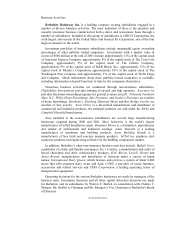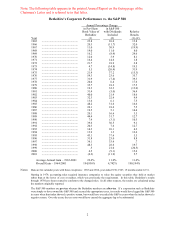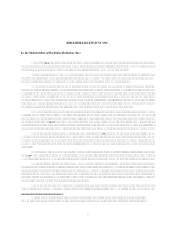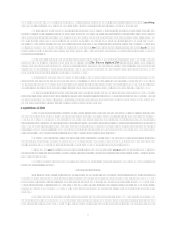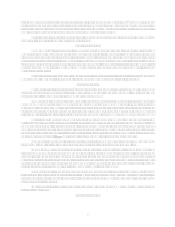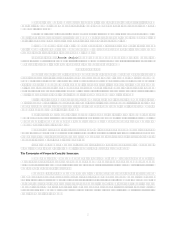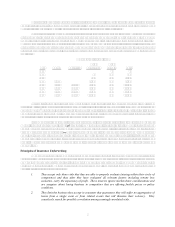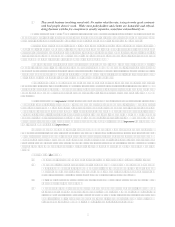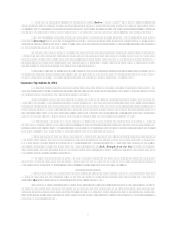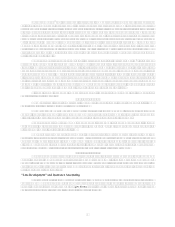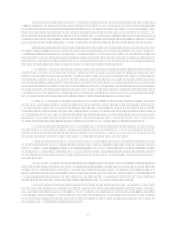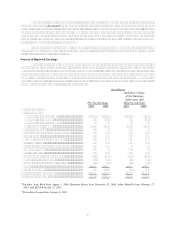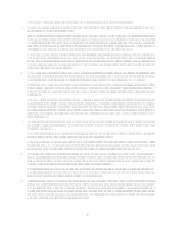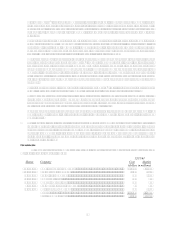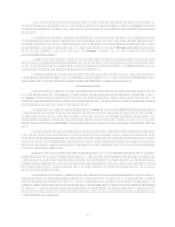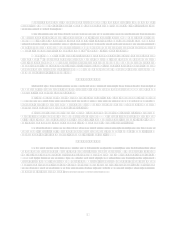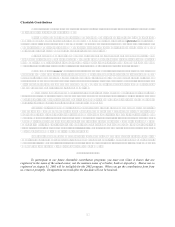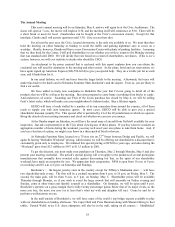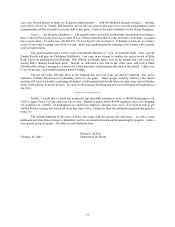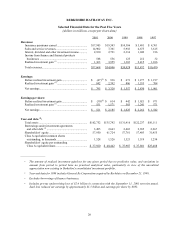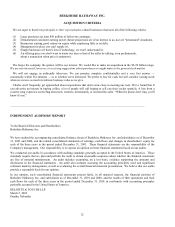Berkshire Hathaway 2001 Annual Report Download - page 12
Download and view the complete annual report
Please find page 12 of the 2001 Berkshire Hathaway annual report below. You can navigate through the pages in the report by either clicking on the pages listed below, or by using the keyword search tool below to find specific information within the annual report.11
In insurance reporting, loss development is a widely used term and one that is seriously misleading.
First, a definition: Loss reserves at an insurer are not funds tucked away for a rainy day, but rather a liability
account. If properly calculated, the liability states the amount that an insurer will have to pay for all losses
(including associated costs) that have occurred prior to the reporting date but have not yet been paid. When
calculating the reserve, the insurer will have been notified of many of the losses it is destined to pay, but others will
not yet have been reported to it. These losses are called IBNR, for incurred but not reported. Indeed, in some cases
(involving, say, product liability or embezzlement) the insured itself will not yet be aware that a loss has occurred.
Its clearly difficult for an insurer to put a figure on the ultimate cost of all such reported and unreported
events. But the ability to do so with reasonable accuracy is vital. Otherwise the insurers managers wont know
what its actual loss costs are and how these compare to the premiums being charged. GEICO got into huge trouble
in the early 1970s because for several years it severely underreserved, and therefore believed its product (insurance
protection) was costing considerably less than was truly the case. Consequently, the company sailed blissfully
along, underpricing its product and selling more and more policies at ever-larger losses.
When it becomes evident that reserves at past reporting dates understated the liability that truly existed at
the time, companies speak of loss development. In the year discovered, these shortfalls penalize reported
earnings because the catch-up costs from prior years must be added to current-year costs when results are
calculated. This is what happened at General Re in 2001: a staggering $800 million of loss costs that actually
occurred in earlier years, but that were not then recorded, were belatedly recognized last year and charged against
current earnings. The mistake was an honest one, I can assure you of that. Nevertheless, for several years, this
underreserving caused us to believe that our costs were much lower than they truly were, an error that contributed to
woefully inadequate pricing. Additionally, the overstated profit figures led us to pay substantial incentive
compensation that we should not have and to incur income taxes far earlier than was necessary.
We recommend scrapping the term loss development and its equally ugly twin, reserve strengthening.
(Can you imagine an insurer, upon finding its reserves excessive, describing the reduction that follows as reserve
weakening?) Loss development suggests to investors that some natural, uncontrollable event has occurred in the
current year, and reserve strengthening implies that adequate amounts have been further buttressed. The truth,
however, is that management made an error in estimation that in turn produced an error in the earnings previously
reported. The losses didnt develop they were there all along. What developed was managements
understanding of the losses (or, in the instances of chicanery, managements willingness to finally fess up).
A more forthright label for the phenomenon at issue would be loss costs we failed to recognize when they
occurred (or maybe just oops). Underreserving, it should be noted, is a common and serious problem
throughout the property/casualty insurance industry. At Berkshire we told you of our own problems with
underestimation in 1984 and 1986. Generally, however, our reserving has been conservative.
Major underreserving is common in cases of companies struggling for survival. In effect, insurance
accounting is a self-graded exam, in that the insurer gives some figures to its auditing firm and generally doesnt get
an argument. (What the auditor gets, however, is a letter from management that is designed to take his firm off the
hook if the numbers later look silly.) A company experiencing financial difficulties of a kind that, if truly faced,
could put it out of business seldom proves to be a tough grader. Who, after all, wants to prepare his own
execution papers?
Even when companies have the best of intentions, its not easy to reserve properly. Ive told the story in
the past about the fellow traveling abroad whose sister called to tell him that their dad had died. The brother replied
that it was impossible for him to get home for the funeral; he volunteered, however, to shoulder its cost. Upon
returning, the brother received a bill from the mortuary for $4,500, which he promptly paid. A month later, and a
month after that also, he paid $10 pursuant to an add-on invoice. When a third $10 invoice came, he called his
sister for an explanation. Oh, she replied, I forgot to tell you. We buried dad in a rented suit.
There are a lot of rented suits buried in the past operations of insurance companies. Sometimes the
problems they signify lie dormant for decades, as was the case with asbestos liability, before virulently manifesting
themselves. Difficult as the job may be, its managements responsibility to adequately account for all possibilities.
Conservatism is essential. When a claims manager walks into the CEOs office and says Guess what just
happened, his boss, if a veteran, does not expect to hear its good news. Surprises in the insurance world have
been far from symmetrical in their effect on earnings.


